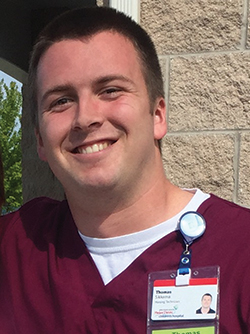Brain Tumor Survivor
Inspiration During Treatment Shapes Future
 Thomas Sikkema was diagnosed with a life-threatening brain tumor at 17. Although the diagnosis was not a welcome one, it helped explain some recent uncharacteristic behaviors. Armed with a treatment plan and a new outlook on life, his positive attitude, combined with the talents of skilled surgeons and an extraordinary team of nurses, led to an exceptional outcome and a bright future.
Thomas Sikkema was diagnosed with a life-threatening brain tumor at 17. Although the diagnosis was not a welcome one, it helped explain some recent uncharacteristic behaviors. Armed with a treatment plan and a new outlook on life, his positive attitude, combined with the talents of skilled surgeons and an extraordinary team of nurses, led to an exceptional outcome and a bright future.
When I was a junior in high school, I had a lot going on emotionally. I became severely depressed, so I saw a psychologist. He felt that my depression was a biological issue, not a mental one. He referred me to my pediatrician, who sent me to a nearby children’s hospital for a CT and MRI. The scan results showed a golf ball-sized mass deep inside my brain.
The next day, I had a spinal tap to look for tumor markers. None were found, which meant it was localized, and that was good, but the tumor was inoperable because of its location. So two and a half weeks later, I was in ICU being prepped for brain surgery to get a biopsy. As if the situation weren’t scary enough, we had to treat it right away because the mass was cutting off circulation. Had the tumor gone undiagnosed, doctors predict I would have had just four weeks to live.
The biopsy results showed a CNS germinoma, a very rare type of brain tumor. Fortunately, the doctors told me it was highly curable.
The diagnosis wasn’t that big of a shock to me because it explained a lot. Along with the depression, I had been having headaches and some double vision. At a recent breast cancer awareness baseball game, I was batting and saw two baseballs instead of one coming at me. Although my parents were optimistic, they were shaken by the diagnosis. I suddenly felt very grown up, and I felt responsible for letting them know everything would be okay.
Two weeks after the surgery, I started four rounds of chemotherapy, which lasted for about three months. Standard protocol was inpatient treatment with two drugs. I would stay in the hospital for about four days. I’d get the medication once a day for three days, then the fourth day would be my recovery day. Then I’d go home until the next round started three weeks later. I had the usual side effects — nausea, vomiting and hair loss. One of the drugs was pretty nasty, so I also had transfusions to build up my platelets and hemoglobin. I took steroids and gained 60 pounds. That was a good thing for combating the weight loss from the nausea and vomiting, and I got to eat whatever I wanted.
After two rounds of treatment, my scan results showed a 95 percent reduction in tumor size. I finished chemotherapy and started radiation therapy to zap any residuals that could still be there. It was the beginning of my senior year, so for five weeks, I went to class Monday through Friday then headed over for radiation treatment every afternoon. That was the treatment I disliked most. Even though it was quick, radiation on your brain is a whole different ball game. There were times during treatment when I could see blue radio waves. Other times, the radiation must’ve hit an olfactory part of my brain because I could smell blueberries during the treatment.
The radiation therapy was the last of my treatment. I am cancer-free now, and I still follow up with scans.
I had a lot of support from my family, friends and my community, and that was incentive to finish the treatment, rejoin them and get back to my life. My family has always been close-knit. My dad was at all of my appointments and treatments. I think it helped him to be with me through everything, and it was also his way of sort of protecting my mom and my brother and sister, who are both younger than I am. My dad’s a tough guy on the outside, but a teddy bear on the inside. I think I’m a lot like him.
My parents kept my brother and sister away from the hospital as much as they could, for all the right reasons. They didn’t want them to see me that sick. I’ve learned that a pediatric cancer diagnosis affects the rest of the family just as much as it does the person with cancer, and it’s important to keep things as normal as possible for everyone. Most of the kids on my hospital floor during my chemotherapy were between three and 10 years old, so I took on the big brother role. My dad taught me that being humorous is a great way to deal with things. I just figured that if I could make someone’s day a little better, why wouldn’t I?
This experience has changed me. Almost overnight, I was forced to grow up, and I began to look at life with a different perspective. As a result, I found my passion. The nurses on my floor were so caring and positive. They are 100 percent of the reason that today, three years after I was diagnosed, I’m a full-time nursing student and an oncology tech on the same floor in the hospital where I was a patient.
I believe fighting cancer is more mental than physical. The medicines and the surgeons do their thing, but you are the only one in complete control of what’s in your head. Positivity is one of the best medicines.


